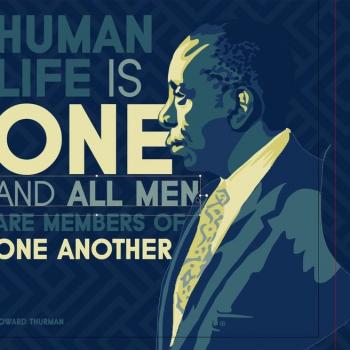The Adventurous Lectionary – August 6, 2023 – The Tenth Sunday after Pentecost
Genesis 32:22-31; Psalm 17:1-7, 15; Romans 9:1-5; Matthew 13:14-21
Everyone needs a blessing, a sense of belonging, a experience of mattering, an affirmation of selfhood. We need a blessing from our parents and significant others, and we need a blessing from God.
To be blessed is to be right with the world and feel at home in our skin. It is to be affirmed and loved just as you are. It is to have a respected person, indeed a deity, call you beloved and pave the way toward the future. Without an authentic blessing, we look for faux blessings through consumption, adulation, power, and control. We can even reach the presidency and bereft of a blessing, thinking we can fill the blessing void with senseless bloviation and thirst for popularity and adoration.
Blessing involves letting go of self-justification and trusting that there is a power that is on your side and seeks your well-being.
Encountering the Holy One can leave you feeling wounded as well as blessed. God is God and we are mortals. Jacob wrestles with a nocturnal stranger whom he believes to be God, refuses to give up, and receives both a blessing and a limp. Jacob is particularly sensitive to the Holy. Despite his ambiguous business dealings, there is something about Jacob that pushes him beyond the obvious. Perhaps the same energy that makes him a fierce and canny businessman also opens him to the influence of the Holy One’s “thin places” in Jabbok and Beth-El, spots where the boundaries between heaven and earth are permeable. Jacob is successful, but he still seeks a blessing. He was once blessed by his father Isaac, but that blessing was a false one, grounded in deception and usurpation. Now, cries out for divine blessing. Jacob is fighting for his life and for his future. He’s holding on for dear life in quest of the authentic blessing that had eluded him. He wants and needs an authentic blessing; not a blessing based on craft or guile but one based on grace. At Jabbok, he’s not contending with impulsive Esau, but the energy that gives birth to creation, part and whole. The fight isn’t fair, and the Holy One, allows Jacob to survive, departing before Jacob can see the divine, and then perish.
Then again, God may be the source of our wrestling. God is questioning us, challenging us, and asking what we need to feel blessed, and how we need to change our lives to respond to God’s vocational call.
The adventurous preacher might ask her or his congregants to identify their personal Jabbok. Where is our personal and congregational place of wrestling? Where is God challenging us and our community? What is worth hanging onto for dear life? Where do you need God’s blessing in this time of pandemic and congregational exile? What is un-blessed and in need of healing?
The Psalmist is also in search of a blessing. He needs a sense of divine vindication in the midst of persecution. He has sought to be faithful, but he needs the intimacy of God’s presence. He needs to feel God’s support and affirmation in a time of conflict; only God’s blessing can deliver him from the threats he feels. Like Jacob, he calls out in the night, awaiting God’s revelation, yearning for God’s blessing.
Paul is crying out for a blessing as well. In this case, he is seeking a blessing for the children of Israel and implicitly for himself as a child of Israel. Spiritually wayward, the people need to turn to God, and yet they do not, despite God’s loving relationship with them. He yearns for a corporate blessing, the blessing of belief and relationship with the Christ. He is willing to take up his own cross and to suffer that they might find wholeness. He believes that in Christ, his fellow Jews will discover the health and peace of mind for which they strive. Christ is the ultimate blessing for every seeking soul, whether Jew or Gentile. Wayward Israel reminds us of our current waywardness as a nation. We are choosing death with the denial of climate change, with politically sanctioned racism and homophobia and the attempt to expunge our nation’s history, and intentional polarization and truth denial.
The gospel reading is also blessing-filled. Jesus goes away for a time of much needed prayer and then returns to face the needy crowds. The crowds yearn for a blessing; they are lost and looking for direction. They need various healings of body, mind, and spirit. Refreshed from his spiritual retreat, Jesus has compassion on them. Jesus’ fatigue is gone and grace and imagination abound. This passage describes a rhythm of contemplation and action. From times alone in prayer, we are renewed spiritually, and new energies and possibilities come to us. We are filled with power and grace. Jesus sees that the peoples’ needs involve their whole lives. Yes, they need to hear good news, but the good news needs to be embodied in a good meal. Spiritual counsel does not suffice if we neglect emotional and physical hungers. We have spiritual hungers as well – for a Sabbath, for good news, for a closer walk with God, for sustenance of body, mind, and spirit. We want to be refreshed, restored, and blessed. We need a blessing to bless others.
(For more on the spiritual well-being of spiritual leaders, see Bruce Epperly, “A Center in the Cyclone: Twenty-first Century Clergy Self-care” and Bruce Epperly and Katherine Gould Epperly “Tending to the Holy: The Practice of the Presence of God in Ministry.”)
In blessing the bread, Jesus blesses embodiment, and challenges us to claim a holistic gospel. Jesus also invites us to be imaginative in our faith: Jesus does the impossible; he feeds a multitude with just five loaves and two fish. We don’t need to worry about the mechanics of the miracle. Jesus expanded his imagination and his creativity became contagious, filling the crowd and feeding them physically as well as spiritually. Whatever mission work we do must be equally holistic: we must attend to persons’ spirits and also their bodies; we must feed the hungry and respond to their spiritual hungers as well. This is especially evident in the growing food insecurity in our time of pandemic. Feeding spirits needs to be complemented by food secure, secure housing and health care, and safety in the streets of our cities.
Jesus blesses us with miracles that expand our morsel into a feast and out of these miraculous moments, we bless others, giving life and nurture. Miracle emerges from within the world, the natural order, chock full with divinity and ready to heal and transform. We all need a blessing, and from that heart-felt blessing we gain the energy to bless and heal the world.
+++
Bruce Epperly is a pastor, professor, spiritual guide, and author of over seventy books, including THE ELEPHANT IS RUNNING: PROCESS AND OPEN AND RELATIONAL THEOLOGY AND RELIGIOUS PLURALISM; PROPHETIC HEALING: HOWARD THURMAN’S VISION OF CONTEMPLATIVE ACTIVISM; MYSTIC’S IN ACTION: TWELVE SAINTS FOR TODAY; WALKING WITH SAINT FRANCIS: FROM PRIVILEGE TO ACTIVISM; MESSY INCARNATION: MEDITATIONS ON PROCESS CHRISTOLOGY, FROM COSMOS TO CRADLE: MEDITATIONS ON THE INCARNATION, and THE PROPHET AMOS SPEAKS TO AMERICA. His most recent books are JESUS: MYSTIC, HEALER, AND PROPHET, PROCESS THEOLOGY AND THE REVIVAL WE NEED and TAKING A WALK WITH WHITEHEAD: MEDITATIONS WITH PROCESS-RELATIONAL THEOLOGY. He can be reached at [email protected]












